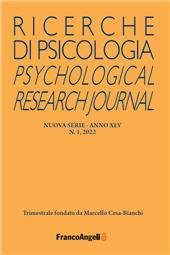2022 - Franco Angeli
Article
Digital Version
Rappresentazioni e atteggiamenti degli insegnanti verso le diagnosi di DSA : costruzione e validazione preliminare di un questionario
1-24 p.
- Questo lavoro presenta un questionario sviluppato per raccogliere ed esplorare le rappresentazioni e gli atteggiamenti degli insegnanti rispetto al recente e considerevole aumento di diagnosi di Disturbi Specifici dell'Apprendimento (DSA) nelle scuole italiane. Il questionario Rappresentazione e Atteggiamenti rispetto ai DSA (RADSA) è stato elaborato sulla base della letteratura di riferimento e di 11 focus group con 92 insegnanti italiani di scuola primaria (96.7% femmine, età M = 47.2 anni, DS = 8.8). I trascritti dei focus group sono stati analizzati con il software TLAB (Lancia 2012, 2018) e i contenuti sono stati convertiti in item per il questionario.
- Successivamente, è stata condotta un'analisi fattoriale esplorativa (con rotazione Direct Oblmin) sulle risposte di 111 insegnanti italiani di scuola primaria, per la maggior parte femmine (94.6%), che hanno partecipato alla seconda fase dello studio. Il range di età di questo secondo campione era compreso tra i 25 e i 63 anni (M = 46.1, DS = 9.34), con una media di 20.18 anni di insegnamento (DS = 11.49). Il questionario RADSA, grazie ai suoi 62 item, divisi in 12 sottoscale, è risultato capace di riflettere la complessità dell'argomento e rappresenta uno strumento di valutazione mirato ad esplorare gli atteggiamenti di insegnanti ed educatori verso la diagnosi di DSA, specialmente quelli che possono minare la qualità della relazione alunnoinsegnante.
- Siccome il RADSA è in grado di identificare le principali rappresentazioni personali riguardanti gli alunni con DSA, si possono progettare interventi mirati per uno specifico contesto educativo, basandoli sui risultati ottenuti dalla sua somministrazione. [Testo dell'editore].
- This work presents a questionnaire developed to gather and explore teachers' attitudes and representations in respect to the recent considerable increase of Specific Learning Disability (SLD) diagnoses in Italian schools. The RADSA questionnaire (acronym including the Italian equivalent of SLD: "DSA") has been constructed on the basis of the reference literature and of 11 focus groups with 92 Italian primary school teachers (96.7% females, age M = 47.2 years, SD = 8.8). Transcripts of focus groups have been analyzed with TLab software (Lancia 2012, 2018) and contents have been converted in questionnaire items.Subsequently, Exploratory Factor Analysis (EFA - Direct Oblimin rotation) was conducted on the responses of 111 Italian primary school teachers, mostly females (94.6%), who participated in the second phase of the study. The age range of this second sample was from 25 to 63 years (M = 46.1, SD = 9.34), with a mean length service of 20.18 (SD = 11.49).
- RADSA questionnaire, thanks to its 62 items loading on 12 subscales, resulted capable of reflecting the complexity of the topic. It represents an assessment tool aimed at exploring teachers' and educators' attitudes towards SLD diagnosis, especially those representations that can undermine the quality of teacherstudent relationship. Since RADSA can identify the main attitudes concerning pupils with an SLD diagnosis, intervention targeted on a specific educational context can be designed on the basis of the results obtained from its administration. [Publisher's text].
Fait partie de
Ricerche di psicologia : 1, 2022-
Informations
Code DOI : 10.3280/rip2022oa13224
ISSN: 1972-5620
KEYWORDS
- Disturbi Specifici dell'Apprendimento, incremento diagnosi, insegnanti, atteggiamento, medicalizzazione, questionario RADSA
- Specific Learning Disabilities, diagnoses increase, teachers, attitude, medicalization, RADSA questionnaire
-
Dans le même fichier
- Mentalization and attachment in educational relationships at primary school
- Rappresentazioni e atteggiamenti degli insegnanti verso le diagnosi di DSA : costruzione e validazione preliminare di un questionario
- Student-teacher relationship representation and school adjustment in primary school
- Perception of school climate, academic performance and risk behaviors in adolescence
- The role of teachers' intelligence conceptions, teaching beliefs and self-efficacy on classroom management practices
- Un intervento per il potenziamento della lettura : nuove evidenze
- Religious and sacred art : recent psychological perspectives
- Il benessere degli studenti tra autostima e rendimento scolastico
- Expectations in psychotherapy : an overview
- Intelligenza emotiva di tratto e burnout professionale negli insegnanti di scuola primaria : una revisione della letteratura


